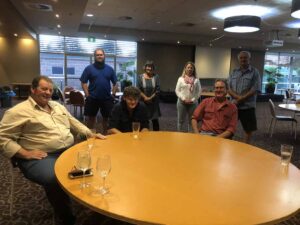 There was only a handful of interested locals who attended a carbon farming information session last week at the Cobar Bowling & Golf Club.
There was only a handful of interested locals who attended a carbon farming information session last week at the Cobar Bowling & Golf Club.
The information session was facilitated by Cobar Shire Council in response to Cr Peter Yench’s calls for support for carbon farming in the Cobar district.
Cr Yench is a strong advocate for carbon farming. He has a 23,000 acre project running on his property, Bulgoo, and has been able to make a number of farming improvements to his land from the payment of carbon credits.
Information session presenter Louisa Kiely, a director of Carbon Farmers and a project developer, was invited by Cobar Shire Council to come and speak to locals and answer any questions they might have about carbon farming.
Carbon farming is the process of changing agricultural practices or land use to increase the amount of carbon stored in the soil and vegetation (sequestration) and to reduce greenhouse gas emissions from livestock, soil or vegetation (avoidance).
Ms Kiely outlined three methods of carbon farming: planting trees; soil carbon; and forest re-growth.
She talked about land and stock management and some of the misconceptions landholders had concerning carbon farming.
“Under no method do you need to exclude stock completely,” Ms Kiely said
She fielded questions about water spreading, growing saltbush, succession planning and what happens if landholders accumulate carbon debits in times of drought and bushfire.
Ms Kiely said while there are a number of carbon farming projects currently running in the Cobar Shire district, there were still some missed opportunities for local farmers to benefit from this method.
Council’s general manager Peter Vlatko said he was disappointed at the turn out for the information session. “It was an opportunity to understand what carbon farming is all about and the potential that is has,” Mr Vlatko said.
